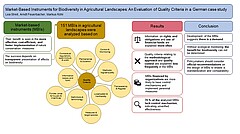Neuw Publication: Market-Based Instruments for Biodiversity in Agricultural Landscapes: An Evaluation of Quality Criteria in a German case study [04.08.25]
Lea Streit, Arndt Feuerbacher & Markus Röhl (2025).

[Translate to English:] Graphical Abstract
Environmental Management: 75, 1472–1486 (2025). doi:10.1007/s00267-025-02162-w
Abstract:
Market-based instruments (MBIs) for the protection and promotion of biodiversity have gained significant importance in recent years. The success of MBIs depends largely on the transparent presentation of their actual effects, which rely on the quality of implementation. Quality criteria can be used to evaluate this. To date, few studies have examined whether and how these criteria are applied. This study seeks to address this gap, by using MBIs in the German agricultural landscape as a case study. Quality criteria were defined on the basis of a literature review; then applied to MBIs identified through an internet search and finally analyzed. Quality criteria related to methodological approaches (implementation, maintenance, used seed mixtures) and quality control (monitoring, localization) are presented less frequently than information on rights and obligations or the use of financial funds. Among the 151 MBIs analyzed, 70% lack control mechanisms and monitoring systems, indicating unverified effectiveness. Additionally, MBIs financed through program approaches are more likely to have control mechanisms and include perennial measures than MBIs funded by direct payments of sponsors or consumers purchasing a product. The development of MBI offerings suggests that there is persistent and growing demand, as some programs have been running for several decades. However, without ecological monitoring, it is not possible to ascertain whether these measures benefit biodiversity. To establish standardized methods for comparing MBIs for biodiversity, policymakers must consider official guidelines and, where appropriate, implement regulatory frameworks.
Back to News